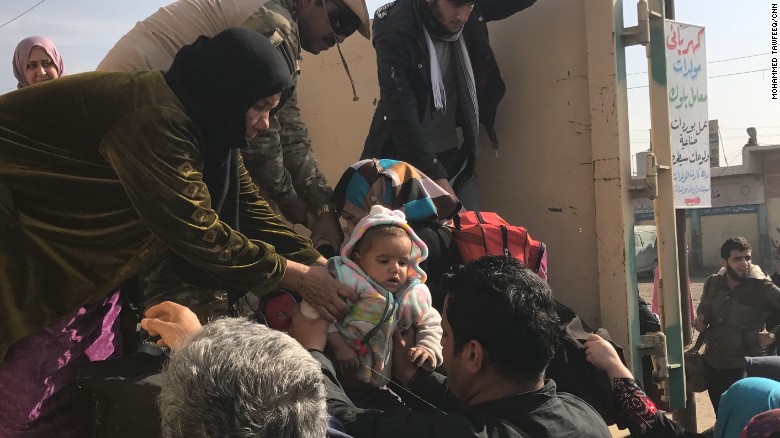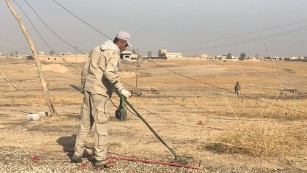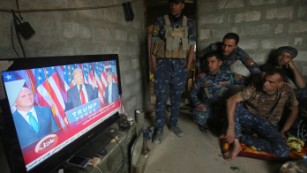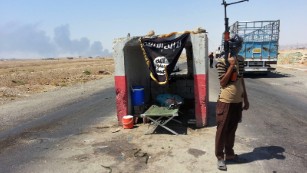In push for Mosul, US coalition pummeling ISIS
The US-led coalition has pounded ISIS targets relentlessly since the offensive to recapture Mosul began last month, a military official told reporters on Tuesday.
The heavy fighting has been evident on the ground.
Witnesses said Iraqi Security Forces and ISIS clashed for several hours as they fight for control over neighborhoods east of the city.
Each side used mortars and RPGs and engaged in close-quarter fighting in some areas, residents said.
As the Iraqi Security Forces have mobilized into Mosul, ISIS has clogged potential access routes using blast walls, buttressing its last standing stronghold and moving farther into parts of the city.
In the eastern Salam neighborhood, residents reported five civilians killed by ISIS mortars as militants fought Iraqi forces in the area. Iraqi security officials said there was progress in the fight in Salam.
The presence of ISIS in certain parts of the city has started to wane.
In some areas, residents said, some ISIS members and sympathizers have started selling their houses, cars and other property to finance escapes.
The sympathizers have met opposition from residents who are discouraging people from buying the cheap property in retaliation for what the ISIS members or supporters did to the citizens of Mosul.
But a number of residents told CNN they are disappointed with the speed of Mosul's liberation.
They said fear across the city among residents has increased because of what they see as slow advances by the Iraqi forces.
ISIS has fortified its positions and regrouped after the Iraqi forces' initial push on Mosul, which was faster than current progress, residents said.
In the last four weeks, coalition forces have hammered ISIS targets with 4,000 bombs, artillery strikes and missiles, coalition spokesman Col. John C. Dorian said. They also have killed hundreds of fighters in the battle to retake Mosul, ISIS' last remaining stronghold, he said.
Nearly 60 vehicles equipped with bombs and more than 80 tunnels have been destroyed, Dorian said at news conference in Qayyara.
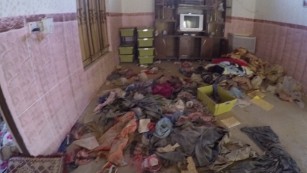
This is what an ISIS booby-trapped house looks like
"We will continue to strike the enemy for as long as it takes for the Iraqi flag to be raised over Mosul and every other corner of this country," Dorian said.
Coalition forces have been helping Iraqi soldiers wrest Mosul from ISIS since the offensive started on October 17. Mosul is the second-largest city in Iraq and is located in the country's north.
Iraqi forces have been slowly battling their way into Mosul and have encountered fierce resistance. But they have made strides.
Mosul: ISIS targets kids with booby-trapped toys
On Sunday, the forces liberated the village of Nimrud, an achievement that drew praise from Dorian. He lauded security forces "for the manner in which they've conducted themselves as they've undertaken a very tough fight in Mosul."
Nimrud is the site of the ancient Assyrian city of Nimrud, founded during the 13th century B.C. Archeologists first began excavating Nimrud in the 19th century.
"The Iraqi security forces have been very deliberate and very careful in order to protect civilian life," Dorian said. "As a member of the coalition I find that level of effort inspiring and I hope that all Iraqis are proud of this level of effort."
Is bombing the s*** out of ISIS a strategy?
Where is al-Baghdadi?
A group of militias who have been fighting and coordinating with the Iraqi military said they have intelligence information that ISIS leader Abu Bakr al-Baghdadi is somewhere between al Baaj and Tal Afar in northern Iraq. The two cities are about 50 miles apart and close to the border with Syria.
The Popular Mobilization Units made the remark as they announced the third phase of their military operations to liberate areas west of Mosul.
The PMU groups are made up of mostly Shiites but also Sunnis, Christians and other ethnic and religious groups.
The goal of the third phase is to liberate the remaining villages towards Tal Afar airbase in west of Mosul.
The airbase will be used as a launching point toward the city center of Tal Afar.
Al-Baghdadi first came into the public eye with a sermon delivered at the Great Mosque of al-Nuri in Mosul in July 2014.
US officials have suggested he may be moving from one place to another within ISIS' shrinking so-called caliphate to avoid detection -- and that they would attack his location if they knew where he was.
Iraqi Ministry of Defense spokesman Brig. Gen. Tahsin Ibrahim would not confirm or deny that al-Baghdadi is in the area.
Iraqi intelligence agencies have solid information that al-Baghdadi fled Mosul along with senior ISIS leaders during the first week of the operation, Ibrahim said.
"We know that al Baghdadi fled Mosul and headed out of the city in a western direction," Ibrahim said. " We also have confirmed intelligence information that al-Baghdadi is not in Tal Afar."
Aid groups stretched thin
The battle has exacerbated widespread displacement of residents in northern Iraq and placed demands on humanitarian groups working to provide aid for civilians making a getaway from war, Refugees International said in a report Tuesday.
In the two years since ISIS began seizing territory across Iraq, 3.3 million civilians have been displaced. The Mosul battle is spurring more civilian flight, the group says. The International Organization for Migration says more than 56,000 people have been displaced since the start of the offensive.
"As the government of Iraq moves to reclaim Mosul from ISIS, civilians from the areas around Mosul -- known as the Mosul corridor -- have already been on the move," Refugees International Senior Advocate Daryl Grisgraber said. About 100,000 have left the region since fighting started.
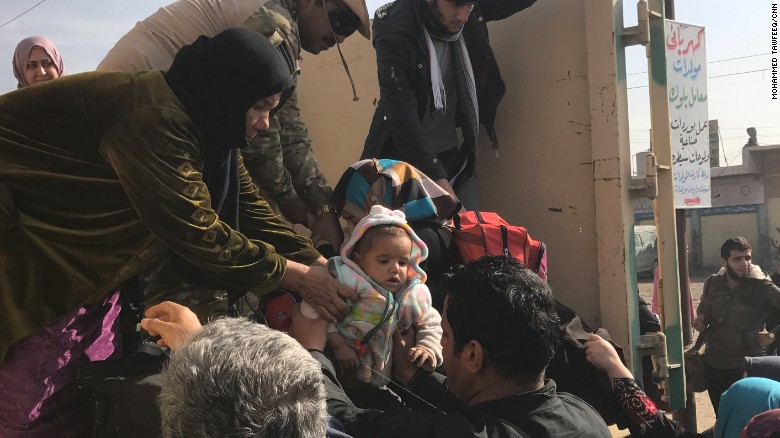
Iraqis scramble to flee the fighting.
The group said the UN's Iraq Humanitarian Response Plan for 2016 is "barely half-funded, as is the emergency appeal to address needs related to Mosul."
"Humanitarian aid groups in Iraq are already struggling to meet the needs of some 10 million people who rely on humanitarian assistance in some form. The humanitarian needs created by Mosul are simply adding to a humanitarian disaster that was already not adequately addressed. Recent events in Iraq will only aggravate that situation," Grisgraber said.
News Courtesy: www.cnn.com

